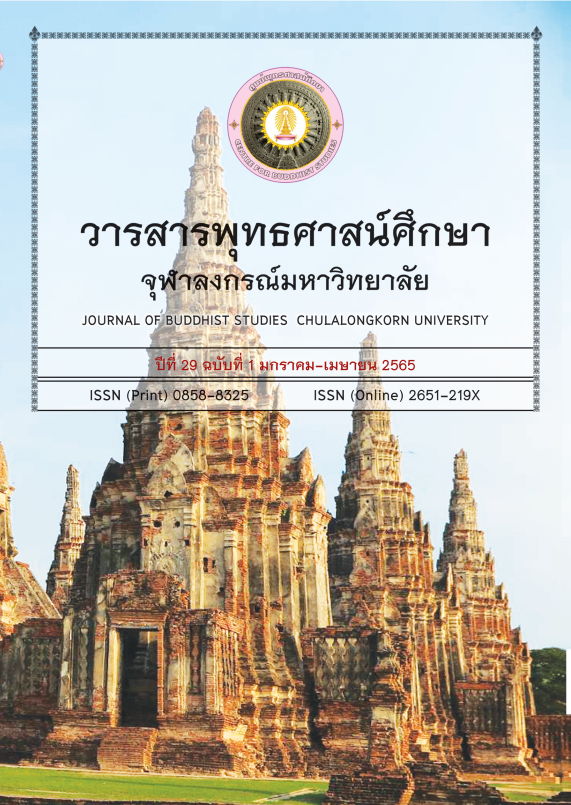An Analysis of the Reasoning and Inquiry regarding Beliefs in the Kalama Sutta
Keywords:
Kalama sutta, Analysis, Reason, Principles of Inquiry, BeliefsAbstract
The Buddha spoke to the Kalama people about the 10 principles of when not to immediately believe something, and showed the principles of reasoning and inquiry in this teaching. The aim of this paper is to find and study the essence of these reasoning principles. From an analysis about the reasoning found in the Suttantapitaka, Anguttara Nikaya, Tiknibat in the section on Great Items, the Kesaputti Sutta Dharma discourse to the Kalama people in the Kesaputti village, it was found that the essence of the principles that the Buddha taught centered on (1) The question of which phenomenal states had merit and which were sinful. Which had negative consequences, and which did not. Which should be reprimanded, which should be praised. Which causes suffering, and which causes happiness. The causes that lead to suffering are greed, anger, delusion, stubborn pride and misconception. The causes that lead to happiness are non-greed, absence of anger, seeing clearly, absence of greed, non-exploitation, being in the Four sublime states of mind, having mahakata, having the effective means to attain successes. (2) The principles of reasoning that the Buddha used to explain the wisdom of knowing when not to believe, relied on the Dharma of associating with a virtuous person, the Dharma about taking advice from a wise person, the Dharma of thinking thoroughly and carefully. This involves thinking the right way and seeing all things using careful consideration, tracing to the origins, finding all the causes, seeing distinctions, and seeing things in their actual states and relations. Another principle is the Dhammanudhammapatipatti [Devata Sutta], the set of dharmas which lead to enlightenment of the world or to the extinction of passion. (3) The discerning nature used in choosing the right principle in thinking, according to the Dharma of thinking thoroughly and carefully, is the practical part of the 10 “refrain from immediately believing” principles.
This paper gives examples from the suttas in the Tripitaka in order to show by analysis the mindfulness that we can bring to bear on a state of awareness, where we can control heart and mind and all things involving body speech and mind. Then only, will we not be careless in using wisdom, because belief without proper discernment can lead to the path of deep sin.
Downloads
References
มหาจุฬาลงกรณราชวิทยาลัย.(2539).พระไตรปิฎก ภาษาไทย ฉบับมหาจุฬาลงกรณราชวิทยาลัย. ชุด 45 เล่ม ใช้อ้างอิง เล่ม 12. เล่ม 13. เล่ม 14. เล่ม 19. เล่ม 20. เล่ม 23. เล่ม 25. เล่ม 34. กรุงเทพมหานคร : โรงพิมพ์มหาจุฬาลงกรณราชวิทยาลัย.
มหาจุฬาลงกรณราชวิทยาลัย.(2557).อรรถกถา ภาษาไทย ฉบับมหาจุฬาลงกรณราชวิทยาลัย. พระสุตตันตปิฎก อังคุตตรนิกาย พระพุทธโฆสเถระรจนา. กรุงเทพมหานคร : โรงพิมพ์มหา จุฬาลงกรณราชวิทยาลัย.
มหาจุฬาลงกรณราชวิทยาลัย.(2557). อรรถกถา ภาษาไทย ฉบับมหาจุฬาลงกรณราชวิทยาลัย. ขุททกนิกาย สุตตนิบาต. พระพุทธโฆสเถระรจนา. กรุงเทพมหานคร : โรงพิมพ์มหาจุฬาลงกรณราชวิทยาลัย.
สมเด็จพระพุทธโฆษาจารย์ (ป.อ.ปยุตฺโต). (2559). พจนานุกรมพุทธศาสตร์ ฉบับประมวลธรรม กรุงเทพมหานคร : โรงพิมพ์พระพุทธศาสนาของธรรมสภา.
สมเด็จพระพุทธโฆษาจารย์ (ป.อ.ปยุตฺโต). (2559).พจนานุกรมพุทธศาสน์ ฉบับประมวลศัพท์. กรุงเทพมหานคร : โรงพิมพ์พระพุทธศาสนาของธรรมสภา.
พระพรหมคุณาภรณ์ (ป.อ.ปยุตตโต),(2557) พุทธธรรม ฉบับปรับขยาย,กรุงเทพมหานคร : โรงพิมพ์มหา จุฬาลงกรณราชวิทยาลัย.
รามิล กาญจันดา.(2547). การศึกษาวิเคราะห์หลักความเชื่อในกาลามาสูตร. วารสารพุทธศาสน์ศึกษา จุฬาลงกรณ์มหาวิทยาลัย.11 (2) 5-8
พระมหาปรทัตติ ยาทองไชย (2561). ความขัดแย้งการตีความปิฎกศัพท์ในกาลมาสูตร.วารสารสห วิทยาการมนุษย์ศาสตร์และสังคมศาสตร์.1 (1) 1-4
พระครูปลัดรังสรรค์ คุณสาโร,ดร. (2559). กาลามสูตร หลักพิจารณาก่อนเชื่อในพุทธปรัชญาเถรวาท. วารสารมหาวิทยาลัยมหามกุฎราชวิทยาลัย วิทยาเขตร้อยเอ็ด.5 (2) 7-11
https://dictionary.sanook.com/พจนานุกรมแปล ไทย-ไทย ราชบัณฑิตยสถาน.
https://dictionary.orst.go.th/พจนานุกรมฉบับบราชบัณฑิตยสถาน 2554.
https://www.khaosod.co.th/สมเด็จพระพุทธโฆษาจารย์ (ป.อ.ปยุตฺโต ป.ธ.9), พุทธวิธีในการสอน.
Downloads
Published
How to Cite
Issue
Section
License
Copyright (c) 2022 Chulalongkorn University Centre for Buddhist Studies

This work is licensed under a Creative Commons Attribution-NonCommercial-NoDerivatives 4.0 International License.
บทความที่ได้รับการตีพิมพ์เป็นลิขสิทธิ์ของศูนย์พุทธศาสน์ จุฬาลงกรณ์มหาวิทยาลัย
ข้อความที่ปรากฏในบทความแต่ละเรื่องในวารสารวิชาการเล่มนี้เป็นความคิดเห็นส่วนตัวของผู้เขียนแต่ละท่านไม่เกี่ยวข้องกับศูนย์พุทธศาสน์ จุฬาลงกรณ์มหาวิทยาลัย และคณาจารย์ท่านอื่นๆในมหาวิทยาลัยฯ แต่อย่างใด ความรับผิดชอบองค์ประกอบทั้งหมดของบทความแต่ละเรื่องเป็นของผู้เขียนแต่ละท่าน หากมีความผิดพลาดใดๆ ผู้เขียนแต่ละท่านจะรับผิดชอบบทความของตนเองแต่ผู้เดียว






